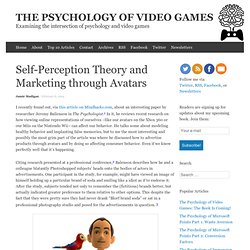

Home.gwu.edu/~halal/Articles/Socio-Econ.pdf. Definition for persona. Bartle test. Self-Perception Theory and Marketing through Avatars « The Psychology of Video Games. I recently found out, via this article on Mindhacks.com, about an interesting paper by researcher Jeremy Bailenson in The Psychologist.

In it, he reviews recent research on how viewing online representations of ourselves –like our avatars on the Xbox 360 or our Miis on the Nintendo Wii– can affect our behavior. He talks some about modeling healthy behavior and implanting false memories, but to me the most interesting and possibly the most grim part of the article was where he discussed how to advertise products through avatars and by doing so affecting consumer behavior. Even if we know perfectly well that it’s happening. Citing research presented at a professional conference, Balenson describes how he and a colleague blatantly Photoshopped subjects’ heads onto the bodies of actors in advertisements. One participant in the study, for example, might have viewed an image of himself holding up a particular brand of soda and smiling like a idiot as if to endorse it. 1. 2. 3. 4. 5. 6.
Ideal Self Image and Game Choice « The Psychology of Video Games. So why do you think you choose to play the games you do?

NO! WRONG ANSWER! Well, actually, you’re probably mostly right about that, but an recent article in Psychological Science suggests that your choice of games and your motivation to keep playing them may have something to do with how well they allow you to experience something deeper and more personal. In the article, Andrew Przybylski (whose work I also cited in my article for GamePro on the appeal of shooters that’s sadly no longer online) and his co-authors hypothesize that we’re motivated to play video games to the extent that they allow us to sample our “ideal self characteristics,” especially when there’s a large gap between our ideal selves and who we actually think we are.
This could help explain why people are attracted to games in a way that’s unique to the medium. As they think they are IRLAs the type of person would like to ideally be IRLAs the type of person they felt like while playing a certain game Hmmm... Advertising through avatar-manipulation. The Psychologist has an article on the surprising effect of seeing a digital avatar of yourself – as if looking at your body from the outside.

The piece covers a range of effects found in psychology studies, from increasing healthy behaviour to encouraging false memories, but the bit on deliberate avatar-manipulation for advertising caught my attention. One such consequence is depicted in Steven Spielberg’s adaptation of the Philip K. Dick short story Minority Report. Specifically, there was a scene in which Tom Cruise’s character looked up at a billboard and encountered an advertisement using his own name. That marketing feat can certainly be recreated in virtual reality. The article also notes that “Based on the findings from this study, the Silicon Valley company LinkedIn is featuring job advertisements that pull the photograph of the job applicant and place it in the job advertisement.” Needless to say, I can’t wait for the next wave of ‘penis enlargement pill’ adverts.